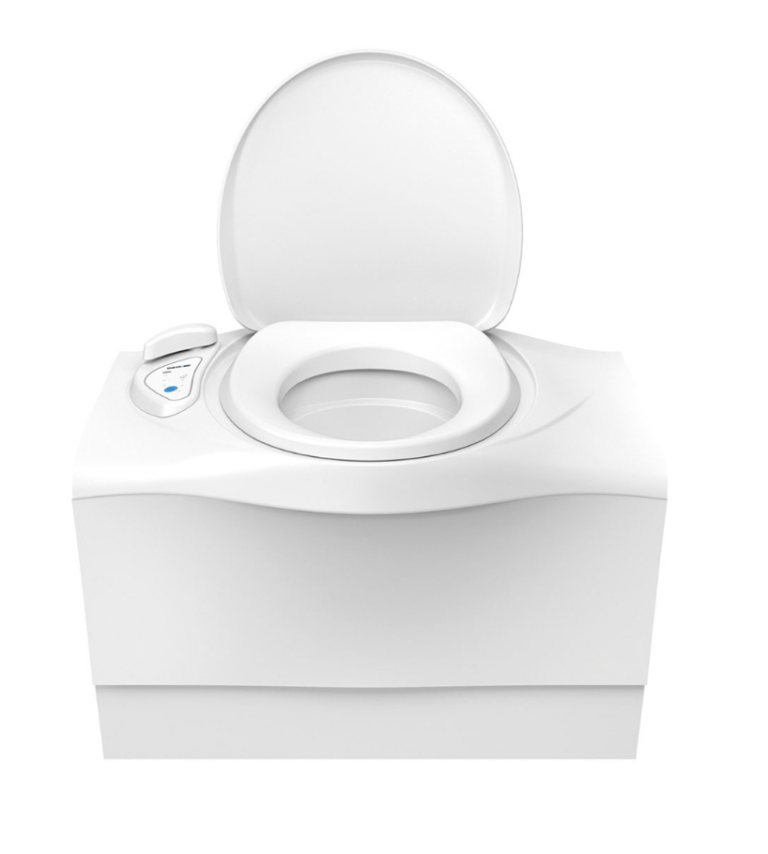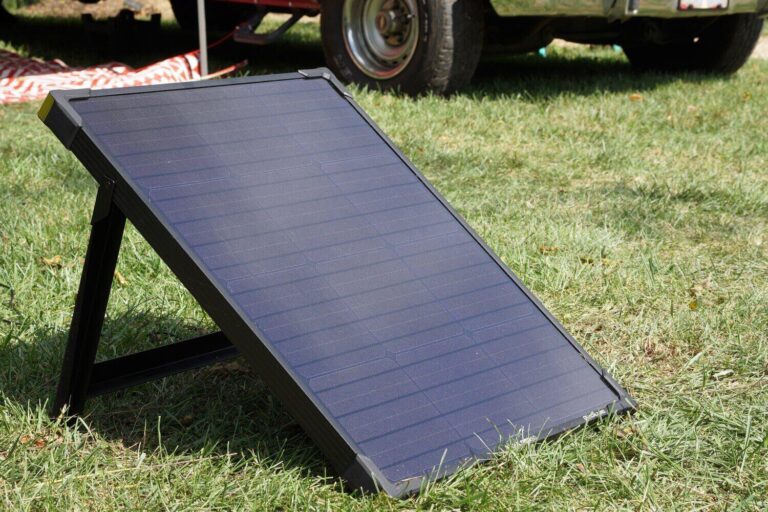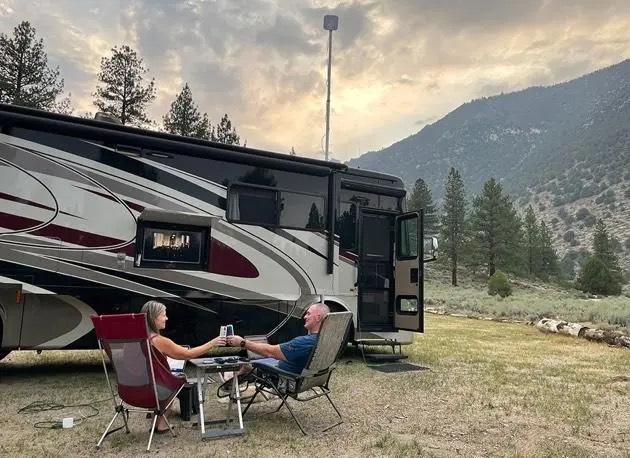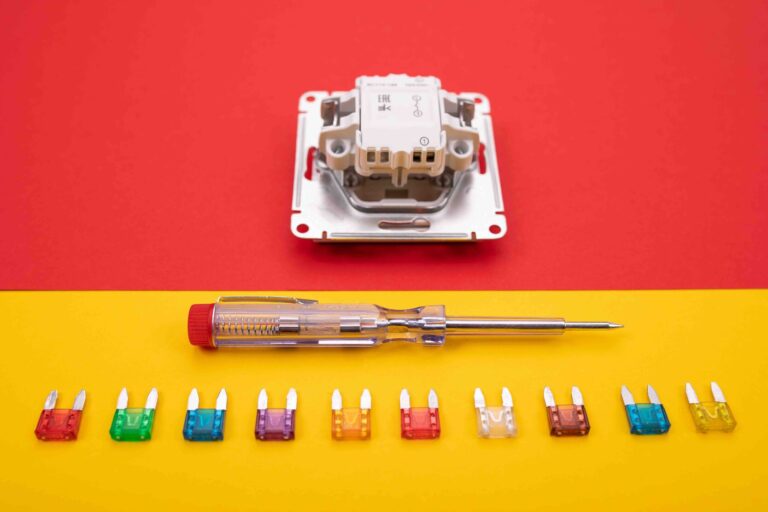4 Best RV Batteries for Solar: Your Guide to Off-Grid Travel

Are you thinking about adding solar panels to your RV and wondering about the best batteries for your setup? Perhaps you’re thinking of upgrading to lithium RV batteries? ( this is me right now )Having the power you need to enjoy your travels ?
Check out the all videos I’ve researched on YouTube they are brilliant at relaying the right information, I know my personal understanding of batteries and solar has increased since watching these a few times , be sure to subscribe and support the channels .
Your battery bank is a vital (and potentially costly) part of your RV solar system, so researching the best RV batteries before purchase is wise before it costs money to re-fix.
Staying in your RV doesn’t mean sacrificing home comforts. Whether it’s your morning coffee fix ( I can’t function with out my coffee machine ) or catching the latest Netflix series in the evening, your RV batteries should have you covered.
Solar panels can keep you going on sunny days, but you need storage for that solar power when the sun isn’t shining.
This list aims to offer a diverse range of batteries to fit any budget. Each option has its pros and cons, but all are reliable and safe batteries for your next adventure.
Mi Battery choice below
Battle Born LiFePO4 Deep Cycle Batteries.
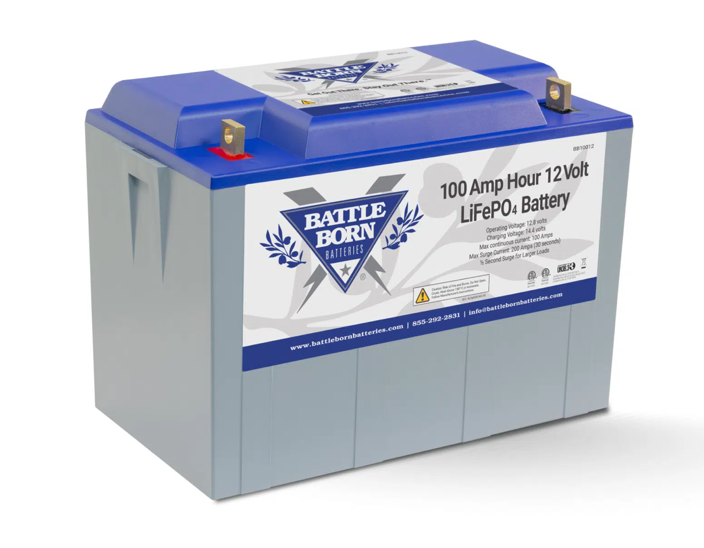
These Batteries are high-performance energy storage solutions designed for a range of applications. Utilizing advanced lithium iron phosphate technology, they offer extended cycle life and greater discharge depth compared to traditional lead-acid batteries. With built-in Battery Management Systems (BMS) for protection and a low self-discharge rate, they’re perfect for off-grid solar systems, RVs, and marine use. These lightweight batteries can be configured in parallel or series for specific power needs, making them a reliable choice.
Renogy Deep Cycle AGM Battery
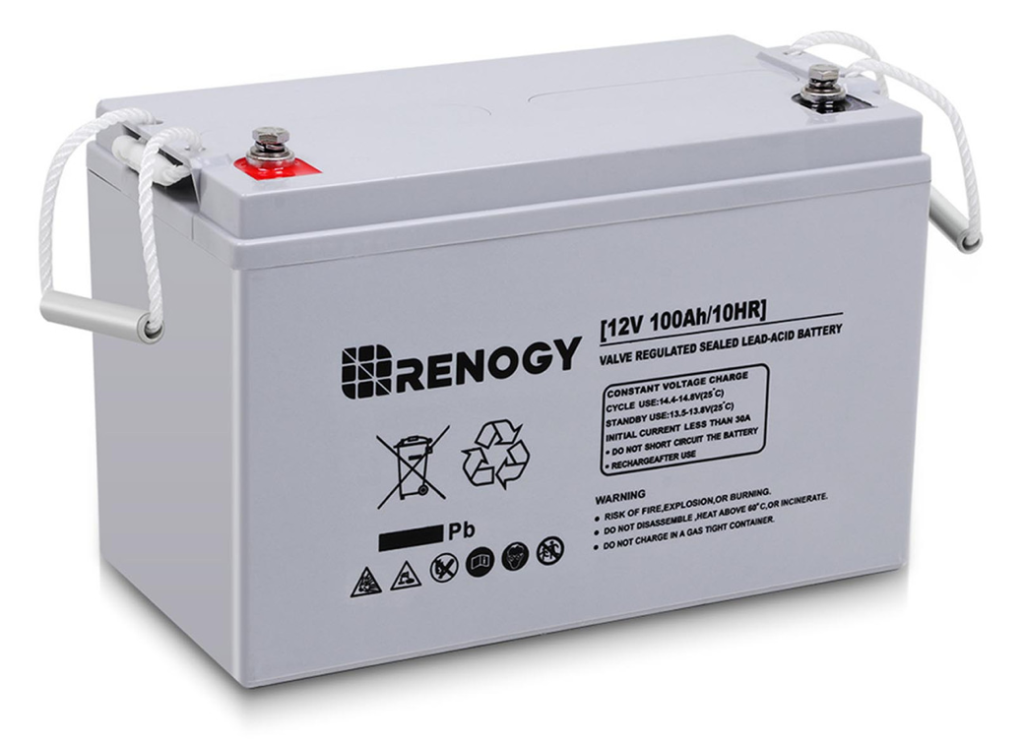
This Battery is a versatile and reliable power source suitable for various applications. With a 100Ah capacity, it’s an ideal choice for powering RVs, boats, and off-grid solar setups. Utilizing absorbent glass mat (AGM) technology ensures efficient and maintenance-free operation. Designed for consistent and dependable performance even in challenging weather, its sealed construction prevents spills and allows for safe use in any orientation. The low self-discharge rate means it retains charge over extended periods, making it perfect for backup or emergency power needs. Additionally, this battery boasts a long lifespan, withstanding frequent charging and discharging cycles effectively. Overall, the Renogy Deep Cycle AGM Battery offers a durable and high-performance solution for a range of power requirements.
LiTime MINI Lithium Battery
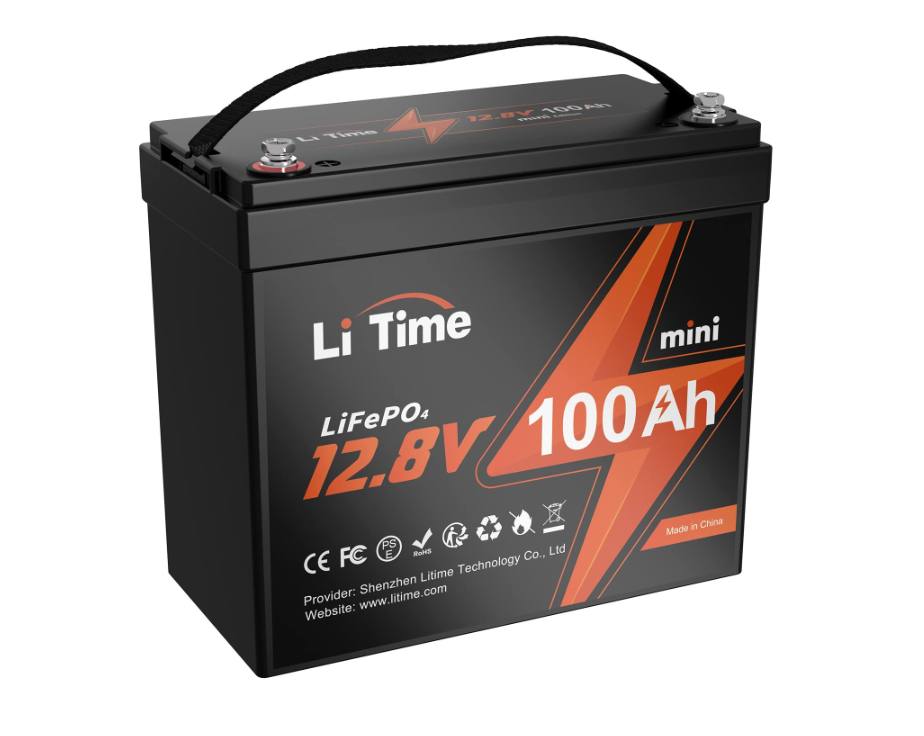
This Battery offers a compact yet potent energy storage solution suitable for diverse applications. Its small size and high energy density make it an ideal fit for tight spaces while delivering enduring power. This battery is perfect for portable electronics like smartphones, tablets, and portable power banks. Noteworthy is its high discharge rate, enabling quick bursts of power, and a low self-discharge rate for prolonged charge retention during periods of inactivity, rendering it dependable for emergency backup or less frequently used devices. Additionally, safety features like built-in over-voltage and over-current protection enhance its design. In summary, the LiTime MINI Lithium Battery presents a trustworthy and effective power solution across a variety of contexts.
WEIZE LiFePO4 Lithium Battery
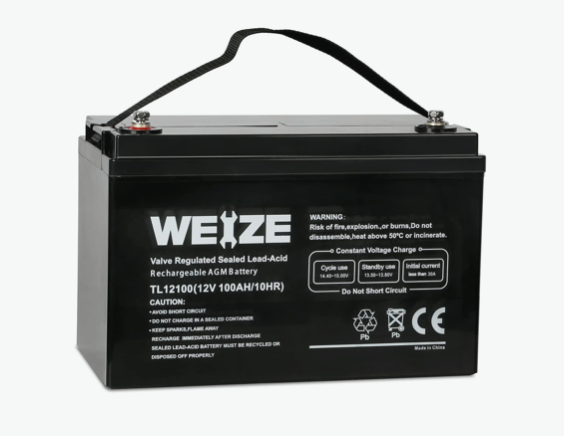
This Battery is a high-quality and durable battery option for various applications. LiFePO4 (Lithium Iron Phosphate) is a type of lithium-ion battery known for its long lifespan, high energy density, and excellent performance. The WEIZE battery is designed to provide reliable power for marine, RV, solar, and other demanding applications. With a voltage of 12 volts and a capacity of up to 100 amp-hours, this battery is capable of delivering consistent and stable power. The LiFePO4 chemistry ensures a safe and stable operation, with minimal risk of thermal runaway or explosion. Additionally, this battery is maintenance-free and has a low self-discharge rate
Understanding Lithium and Lead-acid RV Batteries
Setting off on an off-grid journey requires careful planning and consideration,( something I should have Paid more attention to ?) especially when it comes to powering your recreational vehicle (RV) using solar energy. When you venture into off-grid travel, one crucial aspect is ensuring you have a reliable power source that can keep your RV running smoothly when you need it .
This is where choosing the right RV battery for solar power becomes vital. While there are various battery options available on the market, not all are designed to withstand the unique demands of solar-powered setups.
If you’re planning to venture into the world of RV solar power systems, it’s crucial to understand your battery options.
Types of RV Batteries on the Market
While there are various battery options available on the market, not all are designed to withstand the unique demands of solar-powered setups.
The two MAIN varieties of RV batteries are Lithium & Lead-Acid Batteries
each having its own distinct features.
Lithium Batteries:
- High energy density: Can store a lot of energy in a compact and lightweight package.
- Deep cycle capabilities: Can be discharged more deeply without significant impact on lifespan.
- Faster charging: Higher charge and discharge efficiency, resulting in quicker charging times.
- Longer lifespan: Lasts significantly longer than lead-acid batteries, reducing the need for replacements.
- Lightweight: Ideal for RVs where weight is a concern.
- Ideal for off-grid use: Well-suited for boondocking and off-grid adventures due to efficient energy utilization.
Lead-Acid Batteries:
- Lower initial cost: Generally more affordable upfront compared to lithium batteries.
- Familiar technology: Long-standing and well-understood battery technology.
- Different types available: Includes flooded lead-acid and AGM batteries to suit different needs.
- Adequate for simpler power needs: Suitable for RVers with basic power requirements.
- Reliable performance: Proven track record of dependable power delivery.
- Maintenance required (flooded lead-acid): Requires checking and maintaining water levels in cells.
- Maintenance-free option (AGM): AGM batteries offer a maintenance-free alternative with reliable performance.
Factors to consider
Cost Comparison:
Lithium batteries might seem expensive upfront, but their long-term benefits outweigh this initial cost.
A decent Lithium battery 100Ah could cost anywhere between £200/£300 and £600-£800 and higher the Ah the more the battery will cost .
Battery Capacity:
Battery capacity plays a massive role when deciding between these two technologies. A higher capacity translates directly into longer periods off-grid before needing recharging – perfect for those extended trips out in nature.
Amp Hours:
Amp hours (Ah) is a unit of measurement used to describe the capacity of a battery or the amount of charge it can deliver over time. It is commonly used to measure the capacity of rechargeable batteries, such as those found in electric vehicles or portable electronics. The amp hour rating indicates how many amps a battery can deliver over a certain period of time. For example, a battery with a rating of 10 Ah can deliver a constant current of 1 amp for 10 hours, or 10 amps for 1 hour.
It is important to note that the amp hour rating is not the only factor to consider when evaluating the performance of a battery. Factors such as temperature, age, and discharge rate can also affect the overall capacity of a battery. It is always recommended to refer to the manufacturer’s specifications and guidelines for accurate information regarding a battery’s amp hour rating.
Battery Lifespan:
Battery lifespan refers to the length of time that a battery can operate before it is no longer able to hold a charge. This is an important factor to consider when purchasing devices that are reliant on batteries, such as smartphones, laptops, or electric vehicles. The lifespan of a battery can vary depending on several factors, including the type of battery, the usage patterns, and the overall care and maintenance. Generally, rechargeable batteries have a limited lifespan and will eventually wear out over time.
The capacity of the battery to hold a charge gradually decreases with each charge-discharge cycle. However, with proper care and usage, the lifespan of a battery can be prolonged. This includes avoiding deep discharges, minimizing exposure to extreme temperatures, and using the battery regularly to prevent it from losing its capacity. It is also important to keep the battery clean and free from dust or debris, as this can affect its performance. Overall, understanding battery lifespan is crucial for maximizing the longevity and efficiency of battery-operated devices.
Battery Management System
A battery management system (BMS) is an essential component in modern battery-powered devices. Its primary function is to monitor and control the various parameters of a battery, ensuring its optimal performance and safety. The BMS continuously tracks the battery’s state of charge, voltage, temperature, and current. It also provides protection against overcharging, over-discharging, and short circuits.
By collecting and analyzing data from the battery, the BMS can accurately estimate the remaining battery capacity and predict its remaining useful life. In addition, the BMS can interface with other systems, such as the vehicle management system in electric vehicles, to optimize battery usage and extend its lifespan. With the increasing popularity of electric vehicles and renewable energy systems, the importance of a reliable and efficient battery management system cannot be understated. A well-designed and properly implemented BMS not only ensures the longevity of batteries but also enhances overall system performance and safety.
Battery Maintenance:
Battery maintenance is crucial to ensure longevity and optimal performance. First and foremost, it is vital to regularly check the battery’s voltage levels. This can be done using a multimeter, which will give an accurate reading of the battery’s charge. If the voltage is too low, the battery may need to be recharged. Additionally, it is important to keep the battery clean and free from any dirt or corrosion. A buildup of these substances can interfere with the battery’s performance and may even cause a short circuit.
To clean the battery, a solution of baking soda and water can be used to remove any corrosion on the terminals. It is also recommended to regularly check the battery’s fluid levels and top up if necessary. Lastly, storing the battery properly during periods of non-use is essential. It should be stored in a cool, dry place and kept away from any sources of heat or moisture. By following these maintenance practices, the lifespan and efficiency of the battery can be significantly improved.
Can Lithium Batteries be the best Economically Let’s find out ?
Lithium batteries have gained popularity as a more efficient and durable alternative to lead-acid batteries. While the initial cost of lithium batteries may be higher, they offer significant economic benefits in the long run. Lithium batteries have a longer lifespan, typically lasting up to 10 years compared to the 3-5 years of lead-acid batteries. Additionally, they require minimal maintenance and can be charged faster, reducing downtime.
These factors make lithium batteries a cost-effective choice for various applications, including in RVs. With their higher energy density, lithium batteries provide RV owners with extended power supply, enabling longer trips without the need for frequent recharging. Furthermore, lithium batteries are lightweight, which can contribute to fuel efficiency and overall cost savings in terms of transportation. Overall, despite the initial higher investment, lithium batteries prove to be the best economically due to their longer lifespan, reduced maintenance, improved charging capabilities, and enhanced energy density.
What are Deep Cycle Batteries ?
Deep cycle batteries are a type of battery designed to provide a steady amount of power over a long period of time. Unlike regular batteries, which are used for short bursts of energy, deep cycle batteries are built to withstand deep discharges and repeated recharges. They are commonly used in applications such as solar energy storage, RVs, golf carts, and marine vehicles. Deep cycle batteries can be classified into two main types – lithium batteries and lead-acid batteries.
Lithium batteries are lightweight and offer a higher energy density, making them perfect for portable applications. On the other hand, lead-acid batteries are more affordable and have a longer shelf life. To ensure optimal performance and longevity, deep cycle batteries need to be properly managed. This is where a battery management system comes into play. It monitors and controls the charging and discharging processes, protects the battery from overcharging and deep discharges, and provides useful information about the battery’s health and performance. Overall, deep cycle batteries are essential in storing and providing power in applications that require continuous and reliable energy supply.
Deep cycle batteries: decisions to think about
When considering deep cycle batteries for your solar system, there are a few important decisions to think about. Firstly, it is crucial to understand what deep cycle batteries are and how they differ from regular batteries. Deep cycle batteries are specifically designed to provide a steady amount of energy over a long period of time, making them ideal for solar systems. Next, you should assess the capacity and voltage of the deep cycle battery that will be compatible with the power requirements of your solar panel. This will ensure that your system operates efficiently and effectively.
Additionally, it is important to consider the maintenance requirements and lifespan of the deep cycle battery. Some batteries may require regular maintenance, such as periodic water refills, while others may have a longer lifespan. Finally, take into account the cost and warranty of the deep cycle battery. Investing in a quality battery with a good warranty can save you money and provide peace of mind in the long run. By considering these decisions, you can make an informed choice when selecting deep cycle batteries for your solar system.
Really Can a Solar Panel Charge an RV Battery? yes
Yes, a solar panel can charge an RV battery. Many RV owners are turning to solar power as a source of energy for their vehicles. A solar panel converts sunlight into electricity, which is then stored in the RV battery for later use. This allows RV owners to enjoy the freedom and flexibility of traveling off-grid without worrying about running out of power.
In fact, a well-designed RV solar system can provide enough energy to power all the appliances and electronics in an RV. Furthermore, RV solar systems are easy to install and maintain, making them a convenient and cost-effective solution for powering an RV. Solving the problem of limited battery life and reducing the reliance on campground hook-ups, a solar panel is a reliable and renewable energy source for RV owners. So, if you’re looking to go green and enhance your RV experience, consider investing in a solar panel and take advantage of the benefits it offers.
How Many Solar Batteries Should I Install in My RV?
The number of solar batteries you should install in your RV depends on various factors such as your power consumption needs, the size and capacity of your RV, and the type of batteries you choose to use. Most RV owners opt for lead-acid batteries as they are affordable and widely available. However, if you are looking for a longer lifespan and faster charging, lithium-ion batteries are a popular choice.
To determine the right number of solar batteries, you need to consider your daily power usage and the duration you plan to rely solely on battery power. Calculating the battery capacity needed involves estimating the total power consumption of all your RV appliances and devices and multiplying it by the number of days you want to run solely on battery power. If you plan to rely heavily on solar power, you will need a higher number of solar panels to replenish the battery used. Talking to an RV specialist or consulting with solar power experts can help you determine the ideal number of solar batteries and panels to install in your RV.
What is the Expected Lifespan of My RV Battery During Boondocking?
When boondocking in your RV, the expected lifespan of your RV battery will depend on various factors. The type of battery you have, whether it’s a lithium-ion or lead-acid battery, will play a significant role in determining its longevity. While lithium-ion batteries tend to have a longer lifespan compared to lead-acid batteries, they are also more expensive. It is not uncommon for lithium-ion batteries to last around 8-10 years, while lead-acid batteries typically have a lifespan of 3-5 years.
Another factor to consider is the battery capacity and the amount of power you are consuming during boondocking. If you are using a lot of electrical appliances or systems, your battery will drain faster and may not last as long. However, if you have an RV solar setup and are able to recharge your batteries during the day, it can significantly extend their lifespan. Regular maintenance and proper charging techniques are also important in ensuring the longevity of your RV batteries while boondocking.
Why Do My RV Batteries Keep Losing Charge Frequently?
There could be several reasons why RV batteries keep losing charge frequently. One possible reason is that the RV batteries are old or worn out and need to be replaced. Over time, the capacity of the batteries can diminish, resulting in decreased power storage. Another reason could be that the RV solar system is not working efficiently. If the solar panels are not receiving enough sunlight or are not properly connected to the batteries, the charging process might be interrupted, causing the batteries to lose charge quickly. It is also possible that there is a parasitic drain in the RV electrical system.
This means that there could be appliances or devices that are drawing power from the batteries even when they are not in use, depleting the charge. To prevent this, it is important to disconnect any unnecessary devices when not in use. Regular maintenance and inspection of the RV batteries, solar system, and electrical connections can help identify and address any issues, ensuring that the batteries retain charge for longer periods.
What & How does a RV Battery Work ?
An RV battery is an essential component of a recreational vehicle, providing power for various onboard systems when the RV is not connected to a shore power source. RV batteries are typically deep-cycle batteries, designed to withstand the discharge and recharge cycles common in RV use. They are different from automotive batteries, which are designed for high current output over short periods. RV batteries store electrical energy, allowing users to run lighting, appliances, and other electronics while camping or traveling.
The most common type of RV battery is lead-acid, which relies on a chemical reaction between lead plates and sulfuric acid to produce and store energy. Nowadays, many RV owners are opting for RV solar systems, which use solar panels to charge the RV batteries. These solar panels convert sunlight into electricity, which is then used to charge the batteries. RV solar systems are becoming increasingly popular due to their eco-friendliness and the ability to provide an independent power source for extended periods of boondocking or off-grid camping.
RV battery recharging: How often should it be done?
When it comes to recharging the battery of an RV, the frequency will depend on the usage and the power demands of the appliances onboard. The battery of an RV can be recharged in different ways, including using a solar panel. Solar panels are a great option for recharging the RV battery as they harness the power of sunlight and convert it into usable energy. The frequency of recharging the RV battery with a solar panel will depend on the size of the solar panel and the amount of sunlight available.
If the solar panel is large enough and there is ample sunlight, the battery may get recharged on a daily basis. However, if the solar panel is smaller or there is limited sunlight, the battery may need to be recharged every few days or even weekly. It is essential to monitor the battery levels regularly and ensure that it is sufficiently charged to avoid any power outages while on the road.
What is the lifespan of RV solar panels?
The lifespan of RV solar panels can vary depending on various factors. On average, RV solar panels can last anywhere between 20 to 25 years. However, this estimate is based on optimal conditions and regular maintenance. Factors that can affect the lifespan of RV solar panels include the quality of the panels, the brand, the installation process, and the usage patterns. It’s important to choose high-quality panels from reputable brands and ensure they are properly installed to maximize their lifespan.
Regular cleaning and maintenance are also crucial to keep the panels in good working condition and prevent any damage or deterioration. In addition, extreme weather conditions such as hail, heavy snow, or intense heat can impact the lifespan of RV solar panels. Therefore, it is recommended to monitor and assess the panels regularly and make necessary repairs or replacements when needed to ensure efficient and long-lasting solar power generation for your RV.
RV Solar Panels What Are they exactly ?
RV solar panels are specially designed solar panels that are used to generate electricity for RVs (recreational vehicles) while on the road or at a campsite. They harness the power of the sun by converting sunlight into usable energy. RV solar panels are made up of multiple photovoltaic cells that absorb sunlight and create an electrical current. This current then flows through an inverter, which converts the DC (direct current) energy into AC (alternating current) energy that can be used to power appliances and charge batteries in the RV.
RV solar panels are an essential component of an RV solar system, which also includes a charge controller and a battery bank. The charge controller regulates the amount of current coming from the solar panels to prevent overcharging and protect the battery bank. The battery bank stores the excess energy generated by the solar panels for use during cloudy days or at night when the sun is not shining. Overall, RV solar panels provide a reliable and eco-friendly way to power RVs and reduce dependence on traditional sources of energy.
Is it possible to use residential solar panels for RVs?
Yes, it is possible to use residential solar panels for RVs. Residential solar panels are designed to convert sunlight into electricity and can be mounted on the roof of an RV to provide power while on the road or when camping off-grid. However, there are a few considerations to keep in mind when using residential solar panels for RVs.
Firstly, the size and weight of the solar panels should be compatible with the RV’s roof and structure to ensure proper installation and stability. Secondly, the RV’s electrical system may need to be adapted to accommodate the solar panels and their output, including the addition of a charge controller and an inverter. Additionally, the amount of power generated by the solar panels may be limited by the RV’s roof space and the available sunlight in the camping area. Despite these considerations, residential solar panels can be a cost-effective and sustainable solution for RV owners looking to reduce their dependency on traditional power sources and increase their energy independence while traveling.
Are RV Solar Panels Worth the price
As more and more people embrace the RV lifestyle, finding alternative energy sources for powering their vehicles becomes crucial. RV solar panels have gained popularity as a sustainable and efficient solution. While the initial investment for RV solar panels may seem high, they offer long-term benefits that make them worth the price. Solar panels harness the power of the sun to generate electricity, providing a continuous and renewable source of energy for the RV. This not only reduces reliance on traditional fuel sources but also saves money in the long run. RV solar panels are also eco-friendly, as they produce clean energy without emitting harmful pollutants into the environment.
Additionally, they provide the freedom to camp off-grid, allowing RV owners to explore remote areas without worrying about electricity availability. Despite the upfront cost, RV solar panels provide a reliable and cost-effective way to power your RV with solar energy, making them a worthwhile investment for those seeking a sustainable and efficient solution. RV solar panels can be a worthwhile investment for many RV owners. While they may come with a higher upfront cost, the long-term benefits and savings they offer make them worth the price. RV solar panels harness the sun’s energy and convert it into electricity, which can power various appliances and devices in the RV.
This means that RVers can be self-sufficient and not rely solely on traditional power sources. The use of solar power can also prolong the life of batteries by reducing the need for constant recharging. Additionally, RV solar panels are eco-friendly, as they produce clean, renewable energy without emitting harmful pollutants. They can also provide peace of mind during outdoor adventures, as RV owners can enjoy the convenience of power even in remote locations. In the long run, RV solar panels can result in significant cost savings by reducing or eliminating the need for hooking up to electrical outlets or running generators. Therefore, for those who frequently use their RV and prioritize self-sufficiency, environmental friendliness, and cost efficiency, RV solar panels are definitely worth the price.
What are RV Solar Panel Kits ?
RV Solar Panel Kits are bundles of solar panels and accessories specifically designed for recreational vehicles (RVs). These kits provide an efficient and eco-friendly way to generate electricity for an RV, allowing travelers to enjoy the benefits of solar power while on the road. The solar panel in the kit collects sunlight and converts it into usable electricity, which can then power various appliances and devices in the RV. RV Solar Panel Kits typically include not only the solar panels themselves, but also the necessary wiring, mounting hardware, charge controllers, and inverters.
These components work together to create a complete solar system for the RV, enabling the conversion and storage of solar energy. With an RV solar panel kit, travelers can harness the power of the sun to charge batteries, run lights and fans, operate laptops and televisions, and even power small appliances. This not only saves money on fuel and electricity expenses, but also reduces the carbon footprint, making RV travel more sustainable and environmentally friendly.
Tips on installing Your RV Battery For Solar Power
Installing a battery for solar power in your RV can greatly enhance your camping experience. Firstly, you need to select the right battery for your needs. Consider the capacity, voltage, and compatibility with the solar panel you are using. Once you have the new battery, find a suitable location to mount it securely in your RV. A well-ventilated area is recommended to prevent overheating. Next, connect the positive and negative terminals of the battery to the appropriate cables from the solar panel.
It is important to follow the correct polarity to avoid any damage. Additionally, consider adding a battery monitor to keep track of your battery’s charge level. Finally, don’t forget to test the system and ensure that everything is working properly before hitting the road. By following these tips, you can efficiently harness solar power for your RV, providing you with a reliable and sustainable source of power on your camping adventures.
Tips for Taking Care of Your RV Batteries
Taking care of your RV batteries is essential for ensuring a smoothly functioning vehicle and a stress-free journey. Firstly, it is important to understand the type of battery your RV uses. Most RVs are equipped with lead-acid batteries, which require regular maintenance. Checking the battery water levels and topping them off with distilled water regularly is crucial. Additionally, investing in a battery monitor can be extremely helpful as it allows you to keep track of the battery’s charge and prevent overcharging and undercharging.
It is also essential to store your batteries properly when not in use, keeping them in a cool and dry place. Regularly inspecting the batteries for any signs of damage such as corrosion or leaking is vital, as these issues can cause performance problems or even lead to battery failure. Finally, remember to charge your batteries regularly, especially when they are in storage, to maintain their overall health and longevity. By following these tips, you can ensure that your RV batteries remain in optimal condition and provide reliable power for your camping adventures.
FAQ:
Q: What are the best types of batteries for RV solar setups?
A: The best types of batteries for RV solar setups are typically deep-cycle batteries, such as AGM (Absorbent Glass Mat) and lithium-ion batteries. These batteries are designed to provide sustained power over longer periods and are well-suited for solar applications.
Q: How do I choose the right RV battery for my solar-powered adventure? T
A: To choose the right RV battery for your solar-powered adventure, consider factors like battery capacity, type (AGM or lithium-ion), available space, and budget. AGM batteries are reliable and more affordable, while lithium-ion batteries offer higher energy density and longer lifespans.
Q: Can I use lithium-ion batteries for my RV solar setup?
A: Yes, lithium-ion batteries are a popular choice for RV solar setups due to their lightweight nature, high energy density, and longer lifespan compared to traditional lead-acid batteries. They are more efficient for energy storage and can handle deep discharges without significant capacity loss.
Q:What is the average lifespan of RV solar batteries?
A: The average lifespan of RV batteries used in solar applications varies depending on the type. AGM batteries can last around 5-7 years, while well-maintained lithium-ion batteries can last 10-15 years or more. Proper maintenance and charging practices play a crucial role in extending battery life.
Q: Are AGM batteries suitable for RV solar setups?
A: AGM batteries are a solid choice for solar setups due to their durability, maintenance-free design, and resistance to vibration. On the other hand, traditional lead-acid batteries might require more maintenance and have a shorter lifespan compared to AGM and lithium-ion options.
Q: How many solar batteries do I need for my RV?
A: The number of solar batteries you need for your RV depends on your power consumption needs. Calculate your daily energy usage and consider factors like the battery’s capacity and the amount of sunlight you receive to determine the optimal number of batteries.
Q: What are the benefits of using solar batteries for RV travel?
A: The key benefits of using solar batteries for RV travel include the ability to harness renewable energy, reduce reliance on noisy generators, and enjoy off-grid adventures with a reliable power source. Solar batteries also have a lower environmental impact compared to traditional energy sources.
Q: How can I maintain my RV’s solar batteries for longevity?
A: To maintain and prolong the life of your RV’s solar batteries, keep them clean, avoid deep discharges, and ensure proper charging. Regularly monitor battery voltage levels, avoid extreme temperatures, and follow manufacturer recommendations for optimal battery health.
Q: Is it safe to mix different types of batteries in my RV’s solar setup?
A: It’s generally not recommended to mix different types of batteries in an RV’s solar setup. Mixing batteries with different chemistries, capacities, or charge-discharge characteristics can lead to imbalances and reduced overall performance.
Q: What safety considerations should I keep in mind when using solar batteries in my RV?
A: Safety considerations when using solar batteries in an RV include proper ventilation to prevent overheating, secure battery mounting to avoid movement during travel, and using appropriate protective gear when handling batteries. Additionally, understanding charging protocols and voltage limits is essential for safe battery operation.
Conclusion:
When determining how many solar batteries to install in an RV, several factors need to be considered. The first is the battery capacity, which refers to the amount of energy a battery can store. Lead-acid batteries are commonly used in RVs and have a lower capacity compared to lithium-ion batteries. Lithium batteries, on the other hand, have a higher capacity and are lighter, making them an attractive option for RV owners. Another factor to consider is the number of solar panels and the amount of battery power needed to support your specific energy requirements while on the road. If you plan on using multiple appliances or devices that consume a significant amount of power, it may be wise to install more solar batteries to ensure sufficient power supply. Additionally, the type of battery used also affects the overall battery performance and lifespan. Therefore, it is essential to carefully assess your energy needs, the type of battery, and the desired battery power before determining the number of solar batteries needed for your RV solar system.
Written by Rich
Other blogs discussing around the topic of Batteries , Solar and portable power banks are below
Best Rv Batteries for BoonDocking
Lithium RV Batteries:The Ultimate Guide
Portable Solar Panels for RV’s
Portable Solar Panels for RV’s : Mini Guide
RV Batteries: Beginners Guide to Choosing and Installing 2023

